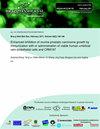矩形法:在大鼠一过性大脑中动脉闭塞模型中对缺血边界区取样的改良技术
IF 1.9
4区 医学
Q2 BIOLOGY
Brazilian Journal of Medical and Biological Research
Pub Date : 2023-12-11
DOI:10.1590/1414-431X2023e13140
引用次数: 0
摘要
迄今为止,在大鼠短暂性大脑中动脉闭塞(tMCAO)模型中,常用的脑缺血边界区采样方法有三种:“两点法”、“对角线法”和“平行线法”。然而,这些方法都有各自的优点和局限性。在这里,我们提出了一种改进的技术(“矩形法”)来采样缺血边界区。在小型动物麻醉机的支持下制备大鼠tMCAO模型。采用高分辨率激光多普勒监测大鼠脑血流,控制模型质量;采用2,3,5-三苯四氯唑(TTC)染色评估脑梗死部位。采用超氧化物歧化酶2 (SOD2)、半胱氨酸天冬氨酸特异性蛋白酶(caspase)-3、caspase-9和热休克蛋白70 (HSP70)验证矩形法的可靠性和重复性。传统(TTC染色后两点钟方向法)组和改良(矩形法)组生物标志物SOD2、caspase-3、caspase-9、HSP70的表达均升高。两组之间没有显著差异。本文提出的矩形法是在对角线法和平行线法的基础上改进而成的,无论脑梗死的位置如何,矩形法都可以提供直接观察到的梗死边界和足够的采样区域,以便后续的实验操作。评估的生物标志物(SOD2、caspase-3、caspase-9和HSP70)证明了矩形方法的可靠性和重复性,这可以促进实验室间的比较。本文章由计算机程序翻译,如有差异,请以英文原文为准。
Rectangular method: a modified technique for sampling the ischemic border zone in a rat model of transient middle cerebral artery occlusion
To date, there have been three common methods for sampling the cerebral ischemic border zone in a rat model of transient middle cerebral artery occlusion (tMCAO): the “two o'clock method”, the “diagonal method”, and the “parallel line method”. However, these methods have their own advantages and limitations. Here, we propose a modified technique (the “rectangular method“) for sampling the ischemic border zone. A rat tMCAO model was prepared under the support of a compact small animal anesthesia machine. Cerebral blood flow was monitored by high-resolution laser Doppler to control the quality of modeling, and 2,3,5-triphenyl tetrazolium chloride (TTC) staining was used for cerebral infarction location assessment. Superoxide dismutase 2 (SOD2), cysteinyl aspartate specific proteinase (caspase)-3, caspase-9, and heat shock protein 70 (HSP70) were used to verify the reliability and reproducibility of the rectangular method. The expression of biomarkers (SOD2, caspase-3, caspase-9, and HSP70) in the traditional (two o'clock method after TTC staining) and modified (rectangular method) groups were increased. There were no significant differences between the groups. The rectangular method proposed herein is based on a modification of the diagonal method and parallel line method, which could provide a directly observable infarct borderline and a sufficient sampling area for subsequent experimental operations regardless of the cerebral infarct location. The assessed biomarkers (SOD2, caspase-3, caspase-9, and HSP70) demonstrated the reliability and reproducibility of the rectangular method, which may facilitate inter-laboratory comparisons.
求助全文
通过发布文献求助,成功后即可免费获取论文全文。
去求助
来源期刊
CiteScore
4.00
自引率
0.00%
发文量
129
审稿时长
2 months
期刊介绍:
The Brazilian Journal of Medical and Biological Research, founded by Michel Jamra, is edited and published monthly by the Associação Brasileira de Divulgação Científica (ABDC), a federation of Brazilian scientific societies:
- Sociedade Brasileira de Biofísica (SBBf)
- Sociedade Brasileira de Farmacologia e Terapêutica Experimental (SBFTE)
- Sociedade Brasileira de Fisiologia (SBFis)
- Sociedade Brasileira de Imunologia (SBI)
- Sociedade Brasileira de Investigação Clínica (SBIC)
- Sociedade Brasileira de Neurociências e Comportamento (SBNeC).

 求助内容:
求助内容: 应助结果提醒方式:
应助结果提醒方式:


